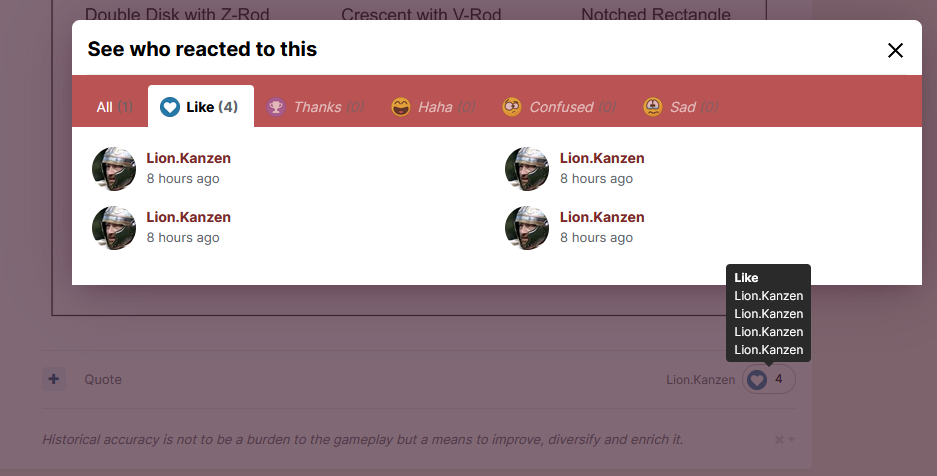-
Posts
2.453 -
Joined
-
Last visited
-
Days Won
88
Everything posted by Genava55
-
.thumb.jpg.b21ca1d0c15fb56b42c39b25a0a40815.jpg)
Inclusion of American civs in 0AD (pre-Columbian)
Genava55 replied to Genava55's topic in General Discussion
Indeed. This area is outside my expertise and I have already too much to read for other mods I am participating with. It would be nice to have someone with an academic background, or at least comfortable with academic literature, and the motivation to tackle this topic. Customized tech tree would be revolutionary but it should be implement first then. -
.thumb.jpg.b21ca1d0c15fb56b42c39b25a0a40815.jpg)
Inclusion of American civs in 0AD (pre-Columbian)
Genava55 replied to Genava55's topic in General Discussion
For your information, I voted yes to the two questions in the poll. My concerns however are: Contrary to the other civilizations already included or to the candidates generally considered, the American civs are purely prehistorical civs. Other civilizations are known from historical records and classical literature. Even people without a proper literature have been described by neighboring civilizations and have participated to the events related to civilizations with a literature we know and understand. For example, Iberians, Gauls and Britons were known and described by the Romans and the Greeks. From those civilizations, we know the names of multiple tribes, the names of several towns, the names of multiple leaders and kings. We know multiple battles and wars they participated in. We know the names of multiple gods they believed in. For the Protoclassic Maya and Zapotecs, we don't have the same level of information. This is an issue for the heroes for example. I don't think there is enough info to find three figures from their period. Currently, the designs of the Maya and Zapotecs have elements going out of our timeframe. Especially the Zapotecs. They have been designed for mods which don't have the same restriction related to the time-line. Although this is not really a big issue. There are some concerns about the balance. The American civs didn't rely as much on metal than our current civs. They didn't have any sort of cavalry. Their weapons are mostly based on Neolithic technologies. Animal husbandry wasn't very developed too. -
I am opening this thread following the debate we had recently about following releases (A28+) and the inclusion of new civilizations. In the past, the community already discussed it, but it didn't get the same level of attention: I think it should be discussed in a specific thread, with a proper title and a proper structure, with a poll to know the opinion of the community. Two civs have been worked on for a mod, the Maya of the Protoclassic / Late-Preclassic period and the Zapotecs : We must remember that 0 A.D. is dedicated to a period of time ranging from 500 BC to 1 AD.
-
The few inscriptions known from this period don't tell much. It doesn't give as much information as the long texts of the Egyptians or of the later Maya. You cannot have a proper account with short inscriptions of less than 10 glyphes. So I maintain my point: this is not history in a strict sense. If it was the case, we should be able to get three real figures for the heroes. But it is not.
-
Are you sure that historical is the correct word? Archaeological yes. Historical no. Archaeology doesn't give you easy answers. Quite the contrary. Folklore from 2500/2000 years ago?
-
This is 0 A.D. copying AoE 2 once again but why not. This is a nice mechanic. Although mostly accessible late in the game.
-
Yes. But the point is that the Iberians are related to the history of multiple people. Their participation to the Punic Wars, their renown as mercenaries etc. While the Maya people and the Zapotecs are not related to anyone among the current civs. We don't even know any event from this period.
-
How do you think we can implement the capture of enemy's horses? Or are saying they should have cavalry at the start ? Siege towers during the protoclassic period? Or is this evidence from the classical period?
-
This story is very dubious. The remains are not accessible to anyone, the guy kept everything and doesn't let anyone access it.
-
I don't see how they are contradicting. If I am exposing the issues, this is not a testimony against their inclusion. This is a talk, to discuss efficiently everyone should be able to expose its view. I am simply highlighting that it could be a challenge. And even if it is a game, it takes its inspiration from history and try to depict the civs fairly. American civs are really a rupture in this regard because they are prehistorical. We don't have any accounts about them. Furthermore their gameplay would be radically different. Currently they have generic heroes. They don't rely on metal. They don't have cavalry. They don't have siege engines. Their navy is not remarquable. Animal husbandry raised for food is limited to turkeys and dogs. It will be difficult to balance them. Edit: Even for a single player campaign, they have limitations. So my point on their prehistorical situation, is that it has impact on their inclusion. This is not something we can dismiss or ignore easily. It has consequences.
-
Maybe you are not getting my point. They won't have any interactions with the current civs. Ever. They were historically and geographically disconnected. You cannot add a missing link. Furthermore, we don't know their history. There is only a few inscriptions known from this period and we don't have any info about the events they lived. We can't name a battle they fought or a king they had at this time. It is only much later we know their history better. I am simply saying I don't think they are the priority. That's my opinion and I don't have any weight on the decision. Sure. Anyway from a pragmatic pov, the Maya and Zapotecs have some very strong arguments: they have 3D models. Something 0 A.D. is desperately looking for.
-
Actually I am in favor of having American civs. Those civilizations are so cool. I simply mean they are not interacting with any current civs. In fact, even if we had Maya people, Zapotecs and Chavin people, it would be three civs that didn't really have interaction during our period. While the Xiongnu and the Scythians are an easy solution to connect the Han with the others.
-
.thumb.jpg.b21ca1d0c15fb56b42c39b25a0a40815.jpg)
Other strategy games not RTS.
Genava55 replied to Lion.Kanzen's topic in Introductions & Off-Topic Discussion
-
Lusitanians are Indo-European. (It doesn't mean I am against or they are a bad candidate, I was just replying to someone initially, i was not making an exhaustive list) Possible but I would say they are lower on the list because they are farther and less related to the others. But I hope one day it will be the case. Currently the Iberians are a mixture of three people: Lusitanians, Iberians and Celtiberians. Obviously at some point, the issue will be solved.
-
0 A.D., except for the mods, is based on the period between 500 BC and 1 AD. So the civ should have existed at least during this period. There are non-Indo-European civs, the Carthaginians, the Kushites and the Han. Technically, the Iberians too but they are poorly designed in this regard. Gangga Negara is a legendary kingdom and its start around the 2nd century AD according to the Malay annals. So it cannot be included. Furthermore, they would have been Hindu (as a religion). So even if their language is not IE, they would have been related to the IE. The best non-IE candidates I think would be the Garamantians, the Numidians, the Kingdom of Saba, the Nabateans, the Xiongnu, the Yayoi people.
-
-
.thumb.jpg.b21ca1d0c15fb56b42c39b25a0a40815.jpg)
Civ: Imperial Romans (Principates)
Genava55 replied to wowgetoffyourcellphone's topic in Delenda Est
@wowgetoffyourcellphone is the leader of the mod. I have nothing to do with this decision, but if I can bring some info to help discuss this topic: "The overall size of the Roman forces in Roman Britain grew from about 40,000 in the mid 1st century AD to a maximum of about 55,000 in the mid 2nd century.[1] The proportion of auxiliaries in Britain grew from about 50% before 69 AD to over 70% in c. 150 AD. By the mid-2nd century, there were about 70 auxiliary regiments in Britain, for a total of over 40,000 men. These outnumbered the 16,500 legionaries in Britain (three Roman legions) by 2.5 to 1.[2] This was the greatest concentration of auxilia in any single province of the Roman Empire. It implies major continuing security problems; this is supported by the (thin) historical evidence. After Agricola, the following emperors conducted major military operations in Britain: Hadrian, Antoninus Pius, Constantius I, and Septimius Severus." / "By the 2nd century, the Auxilia contained the same number of infantry as the legions and, in addition, provided almost all of the Roman army's cavalry (especially light cavalry and archers) and more specialised troops. The auxilia thus represented three-fifths of Rome's regular land forces at that time. Like their legionary counterparts, auxiliary recruits were mostly volunteers, not conscripts." / "Recruitment was thus heavy throughout the Augustan period, with a steady increase in the number of units formed. By AD 23, the Roman historian Tacitus records that there were roughly the same numbers of auxiliaries in service as there were legionaries.[24] Since at this time there were 25 legions of c. 5,000 men each, the Auxilia thus amounted to c. 125,000 men, implying c. 250 auxiliary regiments.[25]" This is simply from different articles on wikipedia. -
I think that if every civs get at least the arrow ship and the boarding ship it could work. From this they could defend themselves. Ramming and artillery would be unique to naval civs.
-
But all civs would get the boarding ships? Same question for the arrow ships. I am asking this because if any civs miss a counter unit, it will increase the gap between the civs on naval maps.
-
.thumb.jpg.b21ca1d0c15fb56b42c39b25a0a40815.jpg)
Others RTS - Discuss / Analysis
Genava55 replied to Lion.Kanzen's topic in Introductions & Off-Topic Discussion
A city-builder on a giant creature game, 'The Wandering Village', made by a Swiss company. -
.thumb.jpg.b21ca1d0c15fb56b42c39b25a0a40815.jpg)
Others RTS - Discuss / Analysis
Genava55 replied to Lion.Kanzen's topic in Introductions & Off-Topic Discussion
I hope it doesn't end like Dawn of Man... https://steamcommunity.com/app/858810/discussions/0/3113647550043480990/ -
https://www.youtube.com/watch?v=AkqxGsYN6Xg&list=PLKVA_doZwYjasBxyqgHJeMGWeUyJSWjxM I am curious, do you like the campaigns in AoE 4? In comparison with AoE 2, AoM, AoE 3,which one do you prefer?
-
.thumb.jpg.b21ca1d0c15fb56b42c39b25a0a40815.jpg)
Fighting techniques references
Genava55 replied to Enrique's topic in Tutorials, references and art help
-
(the pictures come from facebook, so expect the url to die at some point) https://www.facebook.com/ginkgostory/posts/pfbid02howTG2dy7vxSJR3TgJ1H5QX5uMz2yFihGy5EaXepXfVUjcG6pNrR764V664AZLTl






